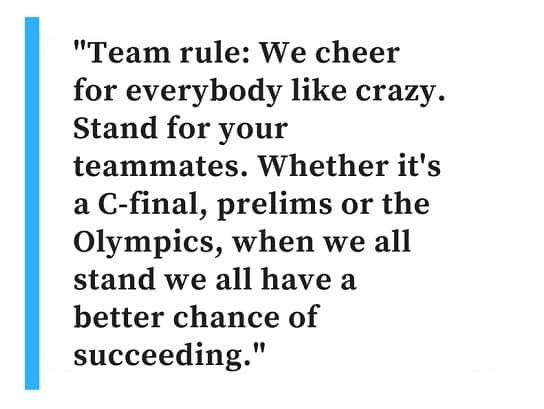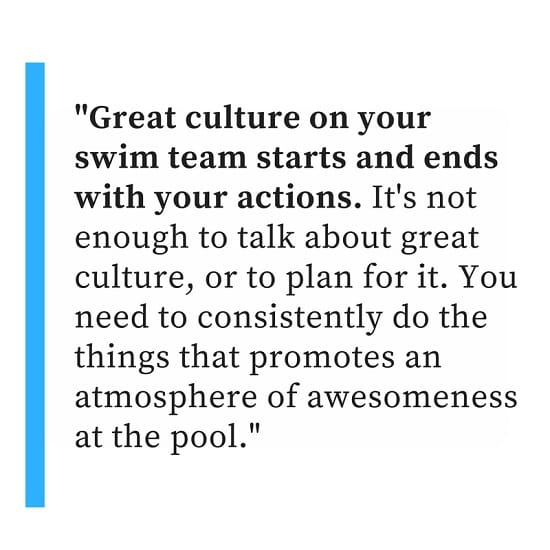10 Things Swimmers Can Do for Exceptional Team Culture
A swim team’s culture can boost your chances of success in the water just as easily as it can hold you back. Here’s how you, the elite-minded swimmer, can do your part to create exceptional team culture.
Great team culture is one of those things that everyone wants, is fun to lob around as a goal for the club, and yet, is hard to pin down or measure.
But you know it when you see it.
Great culture is unmistakable: success is sustained no matter who swims there. The team performs consistently well. Athletes are motivated to be there.
Bad culture is hilariously easy to spot as well: The bad group body language. The inconsistent performances. The low motivation and lack of direction.
Culture is easy to talk about in the abstract. We all want it, after all. But intentions are not good enough. Great team culture isn’t something you talk about, what you think or what you plan on doing. Great team culture is what you do.
Here are ten things swimmers can do to their part in creating a culture where they and the whole swim team are successful.
1. It starts with ownership.
It can be easy to look at the coach as the be-all and end-all for team culture, but at some point, athletes need to step up as well.
The reality is this: an environment that encourages risk-tolerance, is psychologically safe and promotes excellence benefits you just as much as it benefits anyone else.
Don’t wait for other swimmers to be the ones to step up. Yes, it can feel scary stepping up and taking the lead. It takes a lot to be the one to suggest to do one more rep above and beyond what is expected.
It can feel like you are the odd swimmer out by doing the workout properly and not complaining. This is okay—being excellent isn’t normal.
While your coach lays out the workouts and sets a standard for what is expected, it’s still on you to deliver on those expectations.

2. Embrace the newbies.
When a swimmer first joins your group or lane they are most receptive to the tone and attitude of the group. It’s your chance to make a great first impression and set the standard of what is expected.
Welcoming the new swimmers to the group also gives you a chance to remind yourself what kind of expectations you would like to have of the team and group.
3. Work with the younger swimmers.
Many of my favorite memories as a young age grouper were when the older swimmers—who I idolized—took a few moments of their practice to ask how my workout was going, to give me a quick pointer, or to encourage me to try a harder interval.
You don’t need to be a world record holder to have a serious impact on other swimmers in the pool.
4. Struggle together.
Getting through it together matters. Some of my favorite memories from my age group days have nothing to do with personal best times or records. They stem from the times where as a lane or as a group we persevered through a set or a workout.
It felt like it was us against coach or us against the workout. We didn’t always win, but on the times we did it brought us together.
Struggling through stuff together encourages cohesion. There’s no faking the bond that comes from throwing down on Hell Week together and coming through mostly unscathed.
5. Put the backstroke flags away.
When practice ends do you scurry to the locker room or are you helping put the lane ropes away? The backstroke flags? The yard sale of equipment behind the blocks?
You shouldn’t have to wait for anyone to ask you to help with this stuff.
The New Zealand All-Black rugby team, arguably one of the most dominant teams on the planet, clean their own locker room after games. Not assistants, or a janitor, or stadium staff—these revered professional athletes take it upon themselves to “sweep the sheds.”
Stepping up and taking care of your training and competition environment isn’t a chore—it’s showing that you care enough about the culture and the environment to spend a sliver of your time looking after it.
When you care for your environment you develop team-building pride for your crew.
6. Stand for your teammates.
Here’s a simple goal statement for you and your group: On this team we cheer for each other like crazy.
Get your cold, water-logged shorts off those chilly metal bleachers and stand up for your teammates when they are on the block. We’ve all experienced the chills and goosebumps before a big race when your squad gets up and does a banger of a cheer for you right before the whistle.
Make that the standard for your team. Not only will you swim hilariously well, but you’ll have every other team looking over in envy.

7. Get on board with the buddy system.
Accountability can work from a host of different directions. Here are some of the examples you are most familiar with: your parents getting on your case about working hard, and your coach on your case for showing up to practice.
But accountability seems to take on a different shade when it’s coming from one of your peers. After all, you are in the chlorinated trenches together. So there’s a kinship and an understanding there.
Partner up with a teammate who has similar goals as you (maybe not the exact same event) and work together to be more consistent in training.
8. Address what’s hurting the team quickly and together.
Problems happen to every club, good or bad, tiny or super. It’s how quickly and in what manner they are addressed that makes all the difference.
Here are some ways to stay on top of adversity and use it to help propel the group further:
Team captains. Weekly team meetings can help keep the ship on course through the season. Captains also manage some of the intra-personal stuff that can bubble up into real problems. They can help mediate issues and provide an added layer of accountability within the team.
Evaluation. Where can we improve as a group? What are we doing that is totally working? Quick evaluations done regularly can help the group from drifting off mission and stay focused.
Peer help. How can you help someone else in the group to be successful? We don’t need to go this alone—when a group of swimmers gets together and supports each other some insanely awesome stuff starts to happen. Risk tolerance goes up (you feel more comfortable going all out on your goals when you know you have people behind you).
9. Effort is always louder than talk.
At the end of the day, all the rousing speeches, the pep talks and the fancy championship banners don’t matter a chlorinated lick if you aren’t leading by effort.
This point is particularly applicable to swimmers who aren’t naturally extroverts. Generally we view leaders in the pool as being really vocal: but words don’t mean much if they don’t match up to the effort that is being put forth in the water.

In fact, it’s your actions that are the true barometer of your leadership abilities. You can rah-rah your teammates until you’re blue in the face, and talk about having a high expectation of excellence, but without the matching effort it’s got the opposite intended effect.
Look, no one is perfect. No disputing that. You’re human, which means that you are indebted the same amount of off days as every other swimmer on the team. But if you are leading, and the expectation is that you want an all-in effort from other swimmers in the group, you better be bringing the noise in the pool as well.
10. Leadership is found in the quiet moments.
Listening to a teammate who is having a rough day or a bad practice. Giving another teammate a reassuring pat on the back after a bad race. Pushing a teammate to a breakthrough performance in training even though your workout isn’t going as great as you’d like.
Leadership is found just as much, if not more so, beyond the rah-rah speeches and the boisterous cheers. It’s in the countless little moments where success and failure happen on your way to championship season.
This is great news for the quiet swimmer who prefers to lead by example. You can be a world-class introvert and still lead like a champion.




